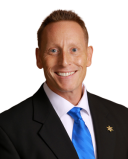Ethics and Morality
In Search of Obi-Wan Kenobi
"Who's more foolish, the fool or the fool who follows him?" -Ben Kenobi
Posted January 12, 2014
When I was a kid, I used to wave a hand in front of my 4-year-old sister and, using my best Jedi mind trick, say something like, "These are not the toys you are looking for" and "Move along" when she came into my room to play. It never seemed to work. Screaming and yelling always followed by "Mom!....Dad!" or "I'm telling!" In my mind I took the high ground before I retrieved my lightsaber (a Stanley retractable tape measure with a belt clip). Okay, this wasn't the Mos Eisley Cantina on Tatooine, but I think you get the picture.
What do you remember most about the character of Obi-Wan Kenobi played by Alec Guinness? He was old and weak yet strangely powerful (remember that thing called "the force?"). He was wise, gentle, kind, and calm. He spoke little, but when he did it was usually profound. In the movies, we remember him as an old hermit who lived in the dunes who people called "Old Ben." He was an aging general from a galactic war who had once been a Jedi Knight. Now a peaceful warrior, we recall him as the archetypal mentor who had watched over a young boy, and when he grew up, revealed his identity so that he could train the new young hero. It was perfect. It was authentic. It was inspiring and we all bought-in to it in 1977 when his ghost whispered to Luke Skywalker to "let go" and "trust your instincts." It was a shared sentiment as we all witnessed Luke's full trust and acceptance into another. After switching off his targeting system and successfully firing the torpedoes that blew up the Death Star, it was a symbolic culmination of destruction-turned-on-itself and we were left to remember that “The Force would be with us...always."
The classical monomyth patterns that are situated in the character of Obi-Wan Kenobi and, further, the original Star Wars trilogy, all provide a mythic arc of storytelling for which we can see the transcendent power of mentors and role models situated within the motif of good vs. evil. As a social scientist and fan, I'm an enthusiastic advocate of its heroic archetypes and find them attractive for ways in which they highlight missing elements of contemporary culture.
We find an older generation of people today who are fearful of the world their children and grandchildren are growing up in. They have good reason for it. Some of my previous articles in this column describe both socio-economic and criminological platforms that have become our new stomping ground. Most concerning is that somewhere amongst our societal slouch we have lost the benefit of true mentors and role models who have always been valuable contributors of a moral compass required to exist and thrive through lifelong challenges.
Our younger generation is suffering today because many know not the nature of reality. They grasp and cling to the unreal and often identify with the socially induced hallucination of the ego. Social media, video games and bad television coupled with non-stop coverage of actors and sports athletes who no longer epitomize the essence of true mentorship permeate our social fabric. If one takes away contracts and endorsements (especially for pro athletes) you’ll find many to be less than relatable to the average citizen.
Philosopher Jay Ogilvy described this postmodern slouch as a principal feature of a lack of transcendent purpose. He explained that de-construction is the consequence of a lack of faith in progress and little access to advice from reliable mentors when it comes to making choices about our goals. "Goals are not given because in neither the historical dimension of purposeful action nor the vertical dimension of some ladder to heaven can one find an absolutely fixed target for taking aim."
When you were growing up who was your hero—your mentor—your role model? Was it a family member? A superhero? A fireman? A sports, film or television star? A teacher, coach or religious leader? We have all had mentors in one domain or another and they live on in our minds and hearts despite our best efforts to "grow up" and reduce them to once upon a time fairytales. Remember them and their heroic qualities. They helped create who we are and have the power to shape our future generations. It's possible that your mentor-hero of yesteryear can also become one to your own son or daughter, grandson or granddaughter, friend or neighbor. Their stories and images can enlighten and inspire. Along with the usual sex, drugs, and alcohol talk, maybe now is the best time to have another “talk”---offer them your hero. If you don't, someone else will and their formative minds may just find a misplaced role model in the hands of raunchy cartoons, ill-adjusted movie stars, or countless athletes and rock stars who get much press and own little moral responsibility.
The notion that life resolves into clear-cut good and evil is difficult to live and even harder to teach. Given so much that is already unreal, we need palpable anchors of worthiness to light our paths. We must celebrate the possibility of a different and better world where the human mind, as it was for Luke Skywalker, can become fate’s vessel for destroying the enemy. Through the tutelage of an excellent mentor and role model can we come to achieve a common power. Who’s your Obi-Wan Kenobi?
Copyright © by Brian A. Kinnaird
References and Suggested Reading:
Campell, J. (1956). The hero with a thousand faces. Meridian. New York.
Lawerence, J. & Robert Jewett. (2002). The myth of the american superhero. Eerdmans Publishing.
Michigan.
Ogilvy, J. (1995). Living without a goal. Doubleday Press. New York.
Siska, W. (July, 1977). A breath of fresh fantasy. Christian Century, pp. 66, 68.




